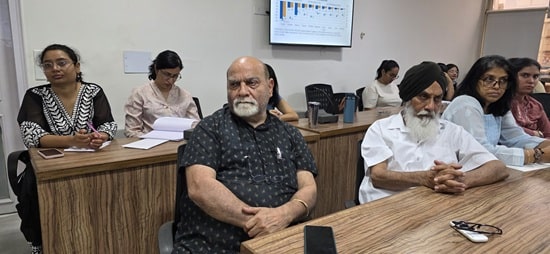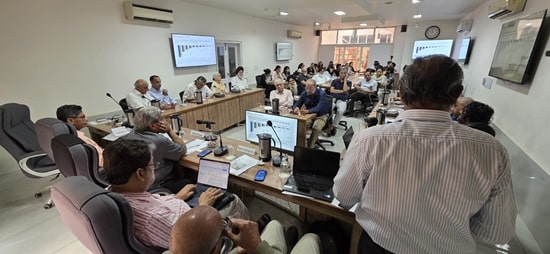Photo Source: Babushahi Bureau
Trump’s tariff war set to reshape global order, warn experts at CASSM round table
Experts at Chandigarh Forum call Trump’s Tariffs a global game-changer with risks for emerging economies
Experts Warn Trump’s Tariff War Could Reshape Global Trade, Threaten India’s Economy
By Baljit Balli
Chandigarh, April 21, 2025 – Leading economists and policy experts have raised alarms over former U.S. President Donald Trump’s aggressive tariff policies, warning that they could disrupt global supply chains, fuel economic nationalism, and pose significant risks to emerging economies like India. The consensus emerged at a high-level roundtable discussion titled Trump’s Tariff Hike: The Big Picture & Implications for India, where participants described the tariffs as a strategic move to redefine the global economic order.
Organized by the Centre for Advanced Studies in Social Science and Management (CASSM) at CU-IDC Chandigarh Campus, the event brought together distinguished, Economic policy experts, scholars, journalists, and policymakers to analyze the far-reaching implications of these trade policies. The discussion underscored the urgency for India to adapt its economic strategies to navigate this volatile global landscape.
A Fundamental Realignment of Global Trade
Prof. J.S. Bedi, a noted economist, highlighted the tariff war’s role in redefining global comparative advantages. “We are witnessing a realignment of supply chains, with new trade routes emerging involving Europe, China, Southeast Asia, Brazil, and Russia,” he said, underscoring the disruption to established trade networks.
Prof. Sunil Kumar Sinha warned of long-term economic fallout, predicting that protectionism, inflation, and uncertainty could stifle global growth, disproportionately impacting working-class and rural communities. “The ripple effects will be felt most acutely by those least equipped to absorb them,” he noted.

Challenges to Emerging Economies
The roundtable emphasized the vulnerabilities faced by emerging markets. Prof. Atul Sood pointed to a rising tide of economic nationalism, which reduces the bargaining power of nations like India. “This shift leaves developing economies exposed to greater volatility and diminished influence in global trade negotiations,” he said.
Prof. Abhijit Das questioned the efficacy of reciprocal tariffs for India, particularly in a tightening global trade environment. “The liberal trade order has always been a myth,” he argued, noting that the U.S. has long employed protectionist measures under the guise of free trade.He also pointed out that it is wrong to consider that only Tariffs will be negotiated during Indo-US trade talks but there are many more issues and sectors, which are not less important than tariffs to be discussed.
Implications for India’s Economic Strategy
Prof. Pramod Kumar, Chairperson of the Institute for Development and Communication, raised a critical question: “Can these tariffs foster income equity, or will they merely spark retaliatory measures between developed and developing nations?” He urged policymakers to consider the impact on India’s emerging middle class and marginalized communities.
Senior journalist Rajesh Mahapatra offered a broader perspective, arguing that Trump’s policies challenge the foundational principles of the American Dream—mass consumption and democratic ideals. “These tariffs not only isolate the U.S. economically but also send shockwaves through economies like India, which rely on stable trade relations,” he said.

A Call for Strategic Adaptation
The session, attended by distinguished academics such as Prof. Ronki Ram, Prof. B.S. Ghuman, Prof. Ashutosh, Prof. Manjeet Singh, Prof. H.S. Shergill, and Baljit Balli, along with students, journalists, and policymakers, highlighted CASSM’s role as a vital platform for addressing global challenges. Participants called for India to recalibrate its trade and economic policies to navigate this volatile landscape while safeguarding its most vulnerable populations.
As the global trade environment grows increasingly uncertain, the roundtable’s insights underscore the need for strategic foresight to mitigate risks and seize opportunities in a rapidly evolving world order.

